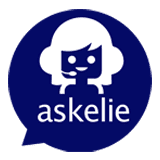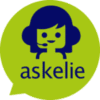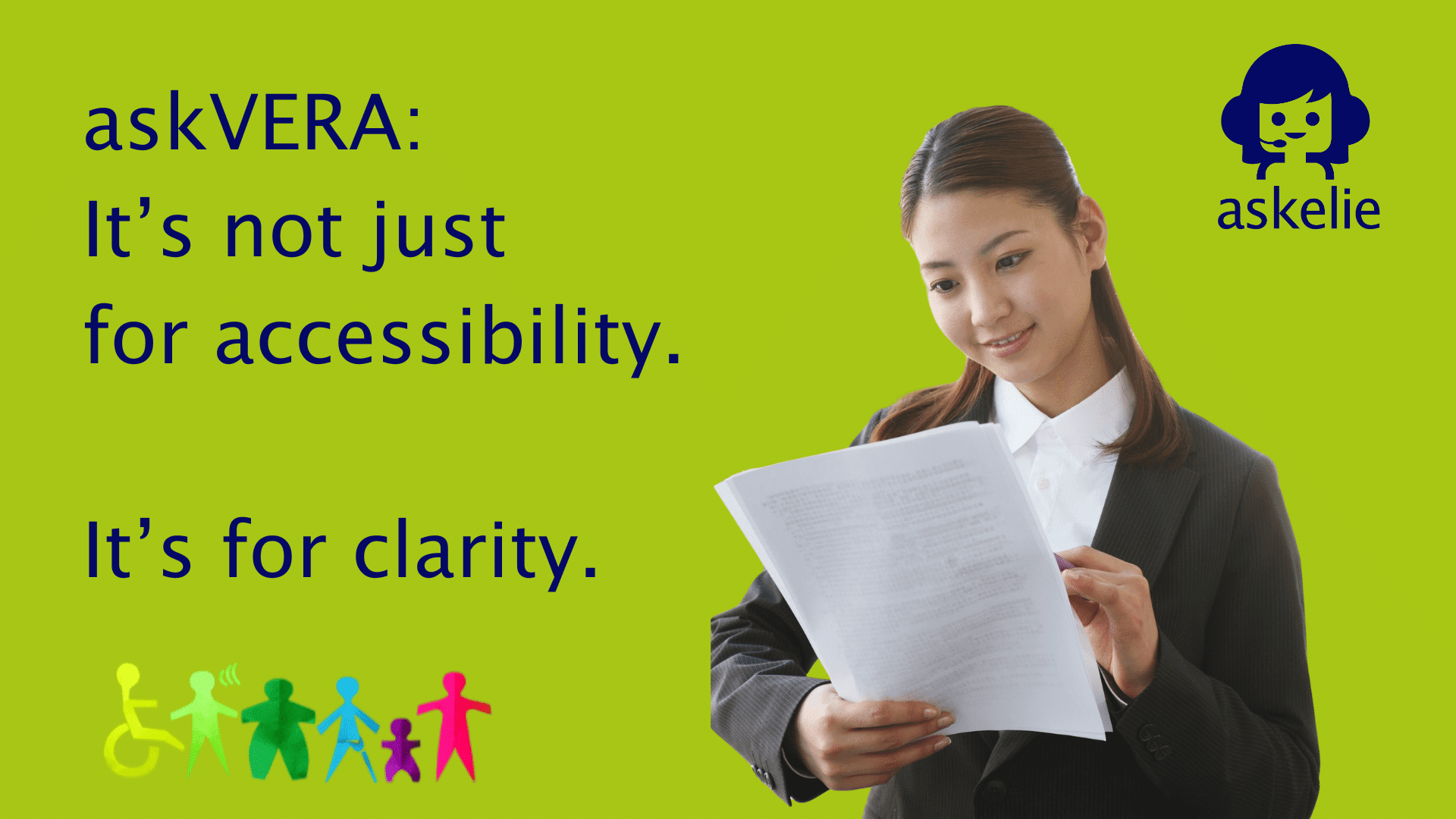Most people hear the term Easy Read and think it is only meant for people with learning difficulties or dyslexia. That is part of it, but the truth is that Easy Read is really about making information clear, visual and understandable for everyone. It removes barriers that stop people from accessing what they need to know and replaces them with simplicity and transparency. In a world full of jargon, acronyms and overcomplicated documents, that is something almost every organisation could use.
At askelie® , we built askVERA to do exactly that. askVERA transforms complex text into Easy Read versions automatically, using private AI to produce clear, visual formats that everyone can understand. But the use of Easy Read goes far beyond accessibility. It is a practical tool that supports communication, compliance, learning and inclusion across almost every sector.
askVERA in Government and Public Sector
Public bodies are expected to serve everyone, not just those fluent in legal or technical language. Easy Read helps councils, departments and agencies explain policies, services and rights in a way citizens actually understand. It can turn long consultation documents into clear summaries, transform regulatory updates into visual guides, and make application forms easier to complete. When citizens understand what is being asked of them, engagement improves and trust builds. It also helps meet statutory accessibility requirements under the Equality Act and the Public Sector Bodies Accessibility Regulations. For government communications teams, Easy Read is both an inclusion measure and a way to reduce the cost of miscommunication.
askVERA in Healthcare and Social Care
Healthcare professionals know how easily misunderstanding can lead to poor outcomes. Patients often struggle with medical language, and carers can find official forms overwhelming. Easy Read materials simplify consent forms, care plans, medication instructions and appointment letters. They make information accessible for people with cognitive impairments, dementia or limited literacy skills, but also for anyone feeling anxious or unwell. In social care, Easy Read can support independence by helping people understand their rights, financial responsibilities and care options. It is also a safeguard for providers, as clear communication reduces risk and demonstrates compliance with the Care Quality Commission’s standards on accessible information.
askVERA in Education and Training
In education, Easy Read has obvious value for neurodiverse learners, but it also benefits students whose first language is not English. Teachers can use it to explain key concepts in simpler terms, make study materials more visual and support inclusion across mixed ability classrooms. For training providers and employers, Easy Read can help staff complete courses or qualifications with less confusion and better retention. When training materials are presented clearly, people learn faster and make fewer mistakes. That translates into measurable performance gains.
askVERA in Workplace and HR
Within organisations, clarity is not just a courtesy; it is a compliance issue. HR policies, contracts and onboarding documents are full of legal and procedural text that many employees skim or misunderstand. Easy Read versions make those policies easier to digest, helping staff understand their rights, obligations and company values. It also supports inclusion for staff with dyslexia or neurodiverse traits. A business that communicates clearly builds a culture of trust, reduces internal disputes and ensures everyone is on the same page from day one. askVERA helps achieve that automatically, turning internal documentation into versions that are easier to read and act on.
askVERA in Legal and Compliance
Legal language is notorious for being dense. Yet every organisation is required to share documents such as privacy notices, consent statements and terms of service. Easy Read allows legal teams to produce plain-English versions that meet accessibility standards while keeping the legal meaning intact. It supports GDPR and equality compliance, and shows that the organisation values transparency. For law firms, it can also help clients understand case documents, agreements or court forms without constant explanation. In regulated industries like finance or healthcare, it reduces the risk of customers claiming they did not understand the information provided. In short, it strengthens both compliance and client relationships.
askVERA in Finance and Consumer Services
Banks, insurers and energy providers face a constant challenge: customers often do not read or understand the fine print. Easy Read turns long, jargon-heavy documents into plain versions that explain what matters clearly. Policy terms, pricing updates, statements and complaint procedures become understandable to a wider audience. This not only reduces customer confusion but also cuts support call volumes and improves satisfaction scores. In a sector where trust is everything, making information readable is a simple but powerful advantage.
askVERA in Community and Charity Organisations
For charities, community groups and not-for-profits, Easy Read is an essential engagement tool. It makes campaigns, forms, and guides inclusive, ensuring messages reach people who might otherwise feel excluded. Volunteers and staff can communicate more clearly with service users and donors alike. Easy Read versions of funding applications or safeguarding policies can also help small organisations demonstrate compliance with funder and regulator expectations. It strengthens inclusion and accountability while saving time on explaining complex text repeatedly.
askVERA to explain AI and Digital Platforms
The rise of AI brings new opportunities for Easy Read. Automation can now produce clear, visual versions of content instantly. askVERA, powered by askelie®, does exactly this, using private AI to convert any text into accessible formats that maintain context and meaning. Beyond accessibility, Easy Read helps train AI models to explain themselves. That makes automation more transparent and understandable for humans, which is vital as AI becomes part of everyday systems in healthcare, law and education. Easy Read also supports digital compliance by aligning with WCAG accessibility standards and data clarity obligations under GDPR and similar regulations. It bridges the gap between technology and understanding.
Why Easy Read Matters
Clarity is not a luxury. It is how you build inclusion, compliance and trust. Whether it is a council explaining a new regulation, a hospital sharing treatment information or a company onboarding staff, communication only works when it is understood. Easy Read brings that understanding within reach for everyone. It benefits people with disabilities, those learning English, and anyone who just wants information without jargon.
At AskELIE, we see Easy Read as part of a bigger shift towards human-centred automation. askVERA is built on that principle. It helps organisations communicate clearly, automatically, and at scale. What used to take hours of rewriting can now be done in minutes while keeping security, privacy and accuracy intact. That is what makes it more than an accessibility feature. It is a business advantage.
Easy Read proves that when information is clear, people act faster, make better decisions and trust the source. It is a simple idea with a wide impact. From policy and healthcare to finance and education, it helps organisations meet legal obligations, improve communication and deliver better outcomes for everyone. And with private AI now capable of producing Easy Read automatically, clarity has finally caught up with technology.
Everyone deserves to understand the information that affects their lives.
Easy Read makes it possible. askVERA makes it automatic.


